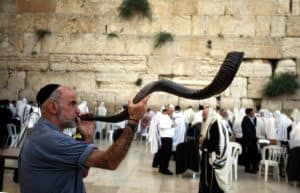Yom Kippur
Rosh Hashanah 
 The Appointed Times #6
The Appointed Times #6  Sukkot
Sukkot
You Kippur. Yom Kippur occurs on the 10th day of Tishri at the close of the High Holy Days (“Days of Awe”) season that opened with Rosh Hashanah and is probably the most important holiday of the Jewish year.
“The tenth day of this seventh month is the Day of Atonement. You shall hold a sacred assembly and humble yourselves, and present an offering made by fire to the LORD.” Leviticus 23:27
From His Kingdom Press book, The Biblical Festivals. See links below for more information.
YOM KIPPUR כפור יום
The Day of Atonement

In the seventh month, on the tenth day of the month, you shall afflict yourselves and shall do no work… For on this day shall atonement be made for you to cleanse you. You shall be clean before the Lord from all your sins. Leviticus 16.29-30
Yom Kippur occurs on the 10th day of Tishri at the close of the High Holy Days (“Days of Awe”) season that opened with Rosh Hashanah and is probably the most important holiday of the Jewish year. Many Jews who do not observe any other Jewish custom will refrain from work, fast and/or attend synagogue services on this day. As noted above, the holiday was first instituted in Leviticus 16 and then included with the others in Leviticus 23:26-32.
The name Yom Kippur means “Day of Atonement” and clearly explains what the holiday is about. It is a day set aside to “afflict yourselves” to atone for the sins of the past year. According to tradition, in Days of Awe all of our names are inscribed in “books” kept by God. On Yom Kippur, the judgment entered in these books is sealed.
Essentially, this day is put forward as your last appeal, your last chance to change God’s judgment by receiving His conviction, repenting, and making amends. However, Yom Kippur atones only for sins between man and God, not for sins against another person. To atone for sins against another person, you must seek reconciliation with that person as soon as you can, righting the wrongs you committed against them before Yom Kippur, if at all possible or appropriate.

Yom Kippur is kept as a complete Sabbath. No work can be performed on that day, and observant people are required to refrain from eating and drinking (even water), washing and bathing, and engaging in sexual relations. It is a complete, 25-hour fast beginning before sunset on the evening before Yom Kippur and ending after nightfall on the day of Yom Kippur. Much of the holiday is spent in the synagogue in prayer. In Orthodox synagogues, services begin early in the morning after the sun has risen and continue until mid-afternoon. People then usually go home for a late afternoon nap and return for early evening services which end at nightfall with the tekiah gedolah, a long blast on the shofar.
On Yom Kippur it is customary to wear either special priestly white garments or a kittel, the white robe in which the dead are buried, to symbolize the sacrificial purification of the temple, which is now identified with our body, and call to mind the promise in Isaiah 1:18 that “though your sins are like scarlet, they shall be as white as snow.”
As we look at the sweep of Biblical commemorations from Passover through Pentecost and culminating in Sukkot up ahead, we recognize a clear pattern. All three Pilgrimage Festivals are related to God’s call through Moses to those who hear His voice to obey Him, leave their bondage, and journey to the Promised Land. Passover, celebrates God’s sovereign and complete salvation of His people. The second festival, Shavuot or Pentecost, rejoices in His investment in them of His Word and the power of His Holy Spirit.
And the third, Sukkot (with Teshuvah, Rosh Hashanah, and Yom Kippur as associated preliminaries), reminds us of the thorough cleansing, purging work God does in releasing and sanctifying His people as they journey as pilgrims through wilderness hardships. For it is only through trials and tribulations that they learned and we now learn how to appreciate and apply His faithful provision in substance, Word, and Spirit in becoming His children.
